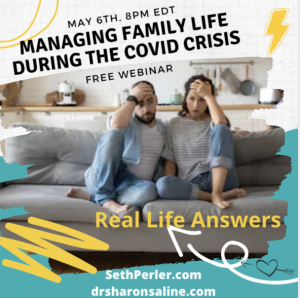 Teenagers can push your buttons like no one else. Teens with ADHD–living through the hormonal turmoil of adolescence in addition to struggling with executive functioning challenges such as impulse and emotional control, organization and motivation, can simultaneously need your support and reject your concern. Unable to skillfully self-regulate, small issues can escalate into volcanic eruptions within seconds. The conflict is as frustrating for you as it is distressing for them. Nobody wants to live in a home marked by anger, yelling and unhappiness amidst frequent provocations. How can you reduce your family’s arguments and find better alternatives? Teenagers push back against their parents as part of their quest to answer the two major developmental issues of adolescence: “Who am I?” and “Where do I belong?” When teens are defiant–rebelling and questioning adult authority–their behavior reflects their burgeoning efforts to separate from their parents and other caring adults while still maintaining their connection. Learning to navigating these attachments while forming your own identity is extremely complicated. It’s a push-pull dynamic inside of them. They want to exercise their independence by making their own decisions and rejecting parental directives but they also rely on their folks for support, guidance and acceptance. They feel confused and resentful but lack the self-awareness and maturity to make more effective choices.
Teenagers can push your buttons like no one else. Teens with ADHD–living through the hormonal turmoil of adolescence in addition to struggling with executive functioning challenges such as impulse and emotional control, organization and motivation, can simultaneously need your support and reject your concern. Unable to skillfully self-regulate, small issues can escalate into volcanic eruptions within seconds. The conflict is as frustrating for you as it is distressing for them. Nobody wants to live in a home marked by anger, yelling and unhappiness amidst frequent provocations. How can you reduce your family’s arguments and find better alternatives? Teenagers push back against their parents as part of their quest to answer the two major developmental issues of adolescence: “Who am I?” and “Where do I belong?” When teens are defiant–rebelling and questioning adult authority–their behavior reflects their burgeoning efforts to separate from their parents and other caring adults while still maintaining their connection. Learning to navigating these attachments while forming your own identity is extremely complicated. It’s a push-pull dynamic inside of them. They want to exercise their independence by making their own decisions and rejecting parental directives but they also rely on their folks for support, guidance and acceptance. They feel confused and resentful but lack the self-awareness and maturity to make more effective choices. Defiance is a relationship problem: communication has broken down and no one feels listened to. Teens become increasingly defiant and reactive when they feel like their needs or opinions are unseen and unacknowledged. They are still struggling with how to pivot when faced with limits they don’t like and tolerate disappointment. As their parents, they need you to meet them where they are: to focus more on your relationship than being right. Expect their pushback and create a predictable plan for dealing with it–regardless of the content. It’s okay for teens to feel angry at their parents for saying “NO” but it’s not acceptable to rage at them, to break things, to damage the house or threaten others. Defiant teens often feel bad about themselves after these episodes. They regret their outbursts but will frequently hide their shame rather than let you see their vulnerability. What they need are tools to manage their intense feelings:
Defiance is a relationship problem: communication has broken down and no one feels listened to. Teens become increasingly defiant and reactive when they feel like their needs or opinions are unseen and unacknowledged. They are still struggling with how to pivot when faced with limits they don’t like and tolerate disappointment. As their parents, they need you to meet them where they are: to focus more on your relationship than being right. Expect their pushback and create a predictable plan for dealing with it–regardless of the content. It’s okay for teens to feel angry at their parents for saying “NO” but it’s not acceptable to rage at them, to break things, to damage the house or threaten others. Defiant teens often feel bad about themselves after these episodes. They regret their outbursts but will frequently hide their shame rather than let you see their vulnerability. What they need are tools to manage their intense feelings:
- Increase their body awareness when they are becoming activated: Identify the signs that things are heating up.
- Discuss clear actions for calming down (listening to music, going for a walk or run and texting with a friend): Write these down and post them.
- Review options for what to do or say when they are upset instead of acting their feelings out. Create a few “If this, then that” phrases such as “If I don’t like what you are saying, then I’ll say that instead of cursing at you or calling you names.’
- Acknowledge their efforts whenever they try to make different choices and when they succeed in behaving in alternative, more effective ways. “I see that you really tried to manage your temper for several minutes. That’s progress.”
- Use incentives that matter to your adolescent and link these to the behavioral changes you want to see. When defiant teens have input, they have better buy-in.
 Remember, they don’t want conflict in your home any more than you do. They just don’t see other ways to get what they want. Working collaboratively and using STOP, THINK, ACT can further reduce your arguments and their surliness:
Remember, they don’t want conflict in your home any more than you do. They just don’t see other ways to get what they want. Working collaboratively and using STOP, THINK, ACT can further reduce your arguments and their surliness:
- Plan for disagreements: STOP: In a calm moment, acknowledge that you will inevitably clash over issues. Instead of heading towards WWIII, create a plan for calling a STOP in the action. The goal of this Time Apart is to cool down before brainstorming any solutions. Set a specific amount of time for this Time Apart, usually around 15 minutes is long enough for the adrenalin-fueled system to calm down. Describe signs and behaviors that indicate this is needed. Make a list of what your teen can do during this break to regulate themselves.
- Re-group for listening: THINK: This is a time where you listen and reflect what your teen tells you is going on for them, how they could make a different choice and share what you can do better too.
- Move forward: ACT: Together, figure out what the next right thing to do is. How can each of you move on from what’s happened? Brainstorm possible solutions and validate any cooperation you receive. This encourages teens to participate in the future.

 When young adults have lived independently, they are accustomed to making their own schedules and sleeping, eating, studying and socializing according to their own rhythm. In general, they’re not that interested in free advice about what they could be doing better or differently. Instead, they want to be respected for the autonomy that they’ve developed and be seen in their developing maturity.
When young adults have lived independently, they are accustomed to making their own schedules and sleeping, eating, studying and socializing according to their own rhythm. In general, they’re not that interested in free advice about what they could be doing better or differently. Instead, they want to be respected for the autonomy that they’ve developed and be seen in their developing maturity.



 FREE WEBINAR with Seth Perler and Dr. Sharon Saline May 6, 2020 8 pm EST Burned out on COVID-19?! We get it. Who would’ve thought that the world would change so dramatically? Schedules? What schedules? Kids are staying up late, sleeping to all hours, chores have gone by the wayside, parents are snippy with each other and the kids, and visa versa. Even the dog is unsure of what’s going on!
FREE WEBINAR with Seth Perler and Dr. Sharon Saline May 6, 2020 8 pm EST Burned out on COVID-19?! We get it. Who would’ve thought that the world would change so dramatically? Schedules? What schedules? Kids are staying up late, sleeping to all hours, chores have gone by the wayside, parents are snippy with each other and the kids, and visa versa. Even the dog is unsure of what’s going on! 